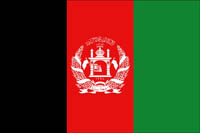Afghanistan denies existence of link between al-Qaida and UK terror plot
The Afghan Foreign Ministry said in a statement that Afghanistan, a former haven of Osama bin Laden, was now an "inhospitable environment" for the terror group to commission attacks outside the country.

In a pointed reference to its eastern neighbor, the government said, "al-Qaida continues to enjoy safe haven outside Afghanistan." It described Pakistan's allegation on Friday of an "Afghanistan-based al-Qaida connection" in the aircraft terror plot as "diversionary."
Pakistan has arrested as many as 17 people in connection with the plot, thwarted in Britain on Thursday, to attack as many as 10 U.S.-bound jetliners using explosives concealed in hand-carried luggage, in potentially the biggest terror attack since Sept. 11, 2001. At least two of those arrested in Pakistan were Britons.
Britain has praised Pakistan for its help in cracking the conspiracy, but the plot has again put the spotlight on Islamic radicalism inside Pakistan despite the government's front line role in the U.S.-led war on terror. Three of the four suicide bombers in the July 7, 2005, attacks on the London transit system that killed 52 people had also visited Pakistan.
Pakistan's Foreign Ministry on Friday named one of the Britons it had arrested as Rashid Rauf, and said that evidence linked him to an "Afghanistan-based al-Qaida connection" in the plot, but gave no more information to back up that claim.
During the hardline rule of the Taliban, bin Laden found sanctuary in Afghanistan and al-Qaida operated terror training camps here. A U.S.-backed military campaign ousted the Taliban in late 2001 and forced al-Qaida to flee, although its fighters are still believed to mount attacks inside the country.
Afghan officials accuse Pakistan of doing too little to stop Taliban and al-Qaida militants using Pakistani soil to stage attacks in Afghanistan that target Afghan and foreign forces, including Americans. Pakistan, however, says it is doing all it can to crush insurgents and has deployed 80,000 troops along the frontier.
Pakistan, a key U.S. and British ally, has touted its "important role" in helping foil the British terror plot, through intelligence cooperation, communication intercepts and the arrests of suspects. Pakistani intelligence officials say they are still hunting for two or three suspects, according to the AP.
Initially, intelligence officials said he was from Lashkar-e-Jhangvi, an outlawed Pakistani militant group having links with al-Qaida, who is wanted in connection with two failed assassination attempts on President Gen. Pervez Musharraf in December 2003.
Subscribe to Pravda.Ru Telegram channel, Facebook, RSS!


